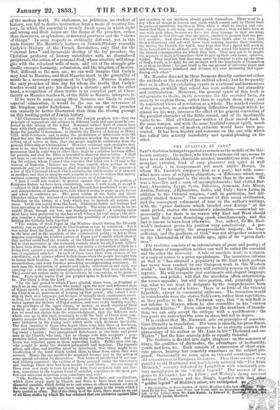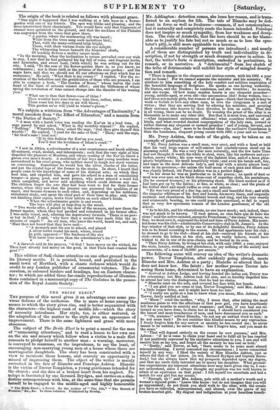fIIE GULISTAN OF SARI. *
SARI'S Gulistan belongs to aperiod as remote as the middle of the thir- teenth century. Its author, who lived to extreme old age, seems to have been an amiable, charitable-minded, unambitious man, of com- monplace exterior, fond of easy pleasures and quiet as well as of study ; in temperament not much unlike Horace, (to whom Mr. Eastwick compares him as a poet,) but with some- what more sense of religious obligation,—a difference which may, however, have belonged to the creeds more than to the men. He was a traveller and a man of accomplishments ; had visited Bar- bary, Abyssinia, Egypt, Syria, Palestine, Armenia, Asia Minor, Arabia, Tartary, Affghanistan, India, and Italy ; knew Latin, in addition to the Oriental tongues, "and, in particular, had dili- gently studied Seneca." The contrast of this social civilization, and the consequent refinement of tone in the author's writings, with the "gross darkness which brooded over Europe" at the same period, excites the translator's admiration,—somewhat un- necessarily; for there is no reason why East and West should have had their most flourishing epoch simultaneously, and the fact is known to have been otherwise. Nor, indeed, do Mr. East- wick's instances prove his position very conclusively. A per- ception of "the unity, the unapproachable majesty, the long- suffering, and the goodness, of God," was not altogether unknown in the Christendom of the middle ages, spite of its "gross dark- ness."
The Gulistan consists of an intermixture of prose and poetry ; of which forms of composition neither can well be called the essential and the other the accessory. A tale or anecdote leads to a stanza, or a copy of verses to a prose apophthegm. The translator informs us that it "has attained a popularity in the East which perhaps has never been reached by any European work in this Western world"; but the English reader will certainly remain on this side rapture. He will recognize just sentiments and elegant language, neatness, and polish ; will find the anecdotes often entertaining, the verses apposite ; but will miss passion, and, generally speak- ing, what we are wont to designate by the comprehensive term "poetry," for want of a better. There is as little of the Oriental hyperbole, except in ceremonial addresses. The invention would be considerable were the stories Sadi's own, rather than repetitions, as they profess to be. Mr. Eastwiek says, that "in wit Sadi is not inferior to Horace, whom he also resembles in his • curiosa verborum felicitas.'" Even allowing for the drawback of transla- tion, we can only accept the critique with a qualification : the two poets are somewhat the same in class, but not in degree.
It is evident that Mr. Eastwiek acts on principles of conscien- tious literality in translation. His verse is smooth, his prose fluent, his annotation critical. He appears to be as strictly exaet to the phraseology of his author as Mr. Lane in his " Thousand-and-one Nights "; but the tone scarcely tells as equally Oriental.
The Gulistan is divided into eight chapters: on the manners of kings, the qualities of darweshes, the advantages of taciturnity, youth and rove, &c. Each consists of a succession of short sepa- rate pieces, bearing but remotely sometimes on the subject pro- posed. Occasionally we come upon an Oriental counterpart to an old acquaintance in European literature. Thus there occurs a al ory parallel to old Hartmann von Aue's lovely metrical tale" Der Arme Heinrich," recently deformed by Longfellow with nineteenth cen- tury metaphysics in the "Golden Legend." The answer of Dio- genes to Alexander has its fellow ; and Wolsey's dying contrast between God's service and the King's, together with that "golden legend' of Molidre's miser, are anticipated.
• The Guliefan, or Rose-Garden, of Shah Muslihu'd-din Saul o listed for the first time into Prose and Verse, with an Introdu Life of the Author, from the Atish Kadah, by Edward B. East Published by Austin, Redford.
The origin of the book is related as follows with pleasant grace.
"One night it happened that I was walking at a late hour in a flower- garden with one of my friends. The spot was blithe and pleasing, and the trees intertwined there charmingly. You would have said that fragments of enamel were sprinkled on the ground, and that the necklace of the Pleiades was suspended from the vines that grew there. A garden where the murmuring rill was heard ;
While from the trees sang each melodious bird ; That, with the many-coloured tulip bright, These, with their various fruits the eye delight. The whispering breeze beneath the branches' shade, Of bending flowers a motley carpet made.
"In the morning, when the inclination to return prevailed over our wish to stay, I saw that he had gathered his lap full of roses, and fragrant herbs, and hyacinths, and sweet basil, [with which] he was setting out for the city. I said, To the rose of the flower-garden there is, as you know, no continuance ; nor is there faith in the promise of the rose-garden : and the sages have said that we should not fix our affections on that which has no endurance.' He said, What then is my course ? ' I replied, For the re- creation of the beholders and the gratification of those who are present, I am able to compose a book, "The Garden of Roses," whose leaves the rude hand of the blast of autumn cannot affect; and the blitheness of whose spring the revolution of time cannot change into the disorder of the waning year.'
"What use to thee that flower-vase of thine ?
Thou wouldst have rose-leaves ; take then, rather, mine. Those roses but five days or six will bloom ; This garden ne'er will yield to winter's gloom."
We subjoin a witticism from "the Advantages of Taciturnity," a moral anecdote from "the Effect of Education," and a maxim from "the Duties of Society."
"A man with a harsh voice was reading the Kur'an in a loud tone. A sage passed by and asked, What is thy monthly stipend ? ' He replied, 'Nothing.' ' Wherefore, then,' asked the sage, dost thou give thyself this trouble ? ' He replied, 'I read for the sake of God." Then,' said the sage, 'for God's sake ! read not.'
'If in this fashion the Kur'an you read, You'll mar the loveliness of Islam's creed."
• • • • "I saw in Africa, a schoolmaster of a sour countenance and harsh address, ill-natured, cruel, mulish, and intemperate ; such that the very sight of him dispelled the pleasure of Muslims, and whose reading of the Kneen threw a gloom over men's hearts. A multitude of fair boys and young maidens were surrendered to his cruel grasp, who neither dared to laugh nor ducat venture on conversing. Sometimes lie would box the silver cheeks of the latter, and put the crystal legs of the former in the stocks. In short, I heard that people came to the knowledge of some of his disloyal acts; on which they beat him, and expelled him, and gave his school to a man of conciliating temper—a pious, good, and meek person, who never uttered a word but when compelled, and never said anything which could distress any one. The children forgot the awe they had been wont to feel for their former master, when they saw that the present one possessed the qualities of an angel, and became (Lemons to each other, and, depending on his mildness, abandoned study, and spent the chief part of their time in play, and, with- out finishing their copies, broke their tablets on each other's heads. "When the schoolmaster gentle is and sweet, The boys will play at leap-frog in the street.
"Two weeks after, I passed by the door of the mosque, and saw there the former master, whom they had pacified and reinstated in his former office.. I was sadly vexed, and, uttering the deprecatory formula, 'There is no pow- er but in God,' I Said, why have they a second time made Iblis the in- structor of angels ?' An old man, who knew the world, heard me, and said, 'Haat thou not heard that they have said—
"A monarch sent his son to school, and placed A silver tablet round his neck, where, traced In gold, appeared—' The fondness of thy sire Will harm thee more than the schoolmaster's ire ?' "
• a • a • • "A darwesh said in his prayers' 0 God ! have mercy on the wicked, for Thou heat already had mercy on the good, in that Thou heat created them
good r
This edition of Sadi claims attention on one other ground besides its literary merits. It is printed, bound, and published in the small town of Hertford, with a chaste richness which would do credit to any London publisher of ornamental volumes. The de- coration, in coloured borders and headings, has an Eastern charac- ter; to which are added three fac-simile reproductions of illumina- tions contained in a manuscript copy of The Gulistan in the posses- sion of the Royal Asiatic Society.



































 Previous page
Previous page